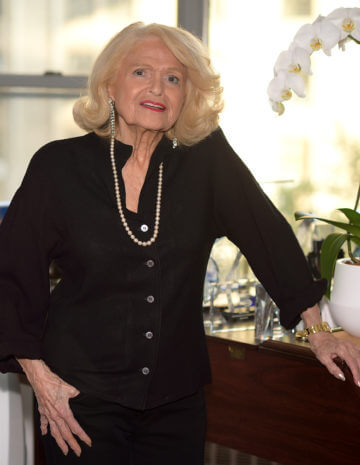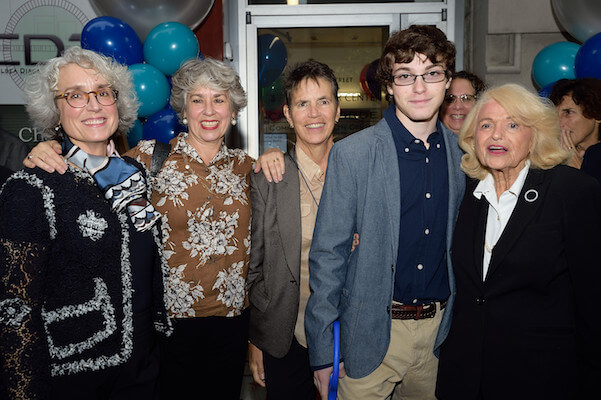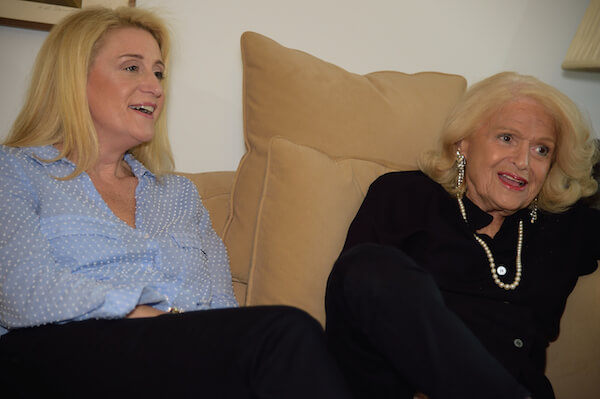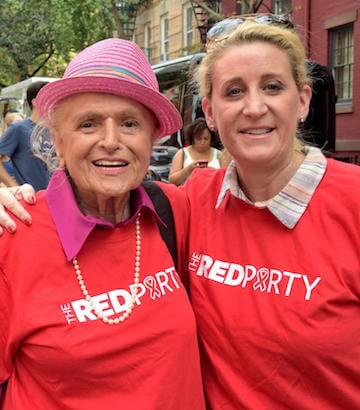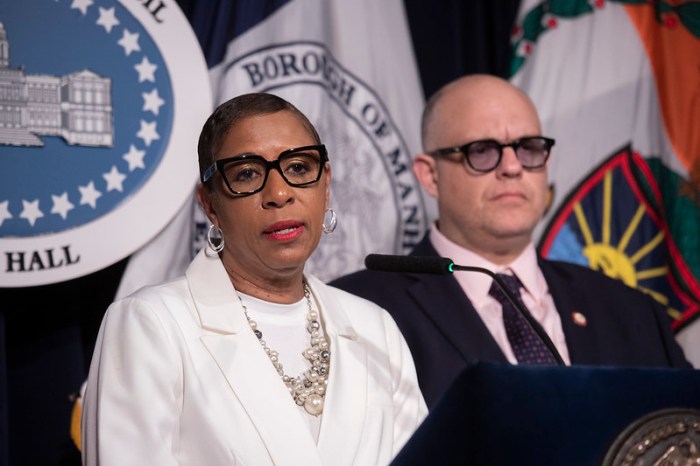Gay City News speaks to Terrence McNally. | MICHAEL SHIREY
BY CHRISTOPHER BYRNE | Terrence McNally is keenly aware of how change happens –– slowly, one person or event at a time. Yet it also happens in a moment. Rosa Parks, he observed, didn’t wake up one day and say she was going to change the world. Gandhi stood firm on the fact that he had bought a first-class train ticket. Edie Windsor wasn’t going to quietly pay an unfair tax bill that said her decades-old and, in its final years, legally recognized relationship did not exist.
These actions, small as they were, were taken by individuals without the intention of touching off revolutions, but these actions became revolutionary as others, emboldened by them, refused to be treated as second-class citizens. As the song “Naughty” in Roald Dahl’s “Matilda” puts it: “In the slip of a bolt, there’s a tiny revolt.” Changing one’s own story is in one’s own hands, and what makes a hero is not just the initial action, but more the consequences of that action in bringing about a world-altering resolution.
“Edie Windsor,” McNally said, “is a hero because a lot of people would have said, ‘This is more than I bargained for.’ They would have found it was not worth doing.” Yet she did, and the nation has irrevocably changed.
That changed world for same-sex marriage is the backdrop for McNally’s latest Broadway play, “Mothers and Sons,” a powerful and poetic play that, like everything McNally writes, is infused with humor and heart (see David Kennerley’s review). It concerns Cal and Will, two married men who are raising a son, Bud. The quotidian nature of their life is what is revolutionary, certainly within the context of none too distant history.
Yet their life in a comfortable Upper West Side apartment is rattled when Katharine Gerard shows up. She is the mother of Andre, Cal’s first lover who died of AIDS 20 years previously. She ostensibly comes to return Andre’s journal, which Cal had sent her. But it soon becomes clear she is seeking something larger — closure, understanding, comfort in her grief, a chance to express her anger, anything to give her soul the rest it can’t find.
At the same time, she causes upheaval in Cal and Will’s home. Will is 15 years younger than Cal and knows of the AIDS crisis only from hearing about it. Their son, Bud, is seven, and is growing up in a world where having two dads is unremarkable, at least in New York City. Will and Bud were not around to be touched by the AIDS crisis in the way that Katharine and Cal were, and so the older man and his dead lover’s mother share a painful, visceral bond with both Andre and AIDS that is merely part of history for the young husband and the child.
McNally leaves it unclear if Katharine ever gets what she came for even as he explores things about Cal that are separate from his life with his husband and son. What is abundantly clear is that in tiny steps we all move forward, scars and all, making it through each day the best we can. That is its own form of heroism.
McNally has enjoyed a remarkable career, both in terms of critical acclaim and in his exploration of gay themes. He is a four-time Tony winner –– for “Kiss of the Spider Woman,” “Love! Valour! Compassion!,” “Master Class,” and “Ragtime.” In 1975, he wrote “The Ritz,” a farce set in a Manhattan bathhouse; 1989’s “Lisbon Traviata” has two opera queens gushing over Maria Callas; the Fire Island Pines is the setting for 1991’s “Lips Together, Teeth Apart”; and in 1998, McNally outraged conservative Christians with “Corpus Christi,” a retelling of the story of Jesus and his apostles as gay men living in Texas.
Terrence McNally with the cast of “Mothers and Sons”: Bobby Steggert, Grayson Taylor, Frederick Weller, and Tyne Daly. | JOAN MARCUS
In “Mothers and Sons,” McNally returns for inspiration to two pieces he wrote previously. The first, a short play, “Andre’s Mother,” had Cal and Katharine at a memorial in Central Park for Andre. It was later turned into a 1990 movie for PBS, which won McNally a screenwriting Emmy. McNally explained his new play came about serendipitously. He was contacted by the Buck’s County Playhouse, which had an opening in its season and needed something. McNally said that the theater thought the 24-year-old screenplay was so complete, “you could practically just retype it.”
McNally had a different idea.
“So much has happened since I wrote that play,” he said. “And I thought, why go back to that bleak epoch of despair? I couldn’t have written this play 25 years ago. AIDS was a crisis and a death threat. This play represents me having lived long enough to look back on where we are.”
Many young LGBT people don’t understand the devastating impact the epidemic had on a community that was already marginalized, McNally argued.
“AIDS is still with us,” he said. “If AIDS had happened to heterosexual men or women, the government would have intervened within a week. Our relationships didn’t exist, and we were more second-class citizens than we realized.”
McNally appreciates the changes that have happened as a result of Windsor’s DOMA case and many other broad cultural shifts, and noted how astonishing the change has been within his lifetime. He vividly recalled the furtive nature of gay clubs in the 1960s and how, even after Stonewall, early pride marches drew crowds only in the hundreds.
“Mothers and Sons” encompasses this history in a subtle way, reflected in the lives of the characters. It is not polemical like the work of Larry Kramer; it is intimate and moving. McNally said he doesn’t think too much about themes or symbols as he is writing.
“I improvise,” he said. “ I have my own antennae and try not to over-think plays.”
Still, when pressed about his intentions in his work, he said, “I do think there is a theme in my work: homophobia as the opposite of unconditional love. I don’t understand it. Is the worst thing a person could do is love someone of their own sex?”
And, he added, “Homophobia didn’t end last June.”
The responses to the play have been diverse. McNally said older gay people have a hard time understanding Will, Cal’s younger husband. He suggested many are uncomfortable with Will’s confidence, his freedom from the internalized homophobia of Cal’s (and their) contemporaries.
Others are grateful to McNally for finding a way to dramatize LGBT history, something he did more explicitly in his 2006 play “Some Men,” which was more historical in its structure. McNally acknowledged the effects of history’s changes in his own life, and one of them made it into “Mothers and Sons.” When he married his partner Tom Kirdahy, he said, the first time he tried to say “husband,” the word was hard to get out. Today, he said with a laugh, “My favorite words are, ‘the reservations are in my husband’s name.’”
McNally is an ardent believer in the power of theater to keep conversations going and enlighten people.
“Theater is still a wonderful medium to get people together,” he said. “It’s fine if they disagree with the things I say, if they listen in a thoughtful way.”
Certainly, there is a lot to think about in “Mothers and Sons.” Among it’s many virtues is the fact that all the characters are sympathetic. We understand them in the context of their unique lives and their times. Through them we see the evolution of a culture, how change sometimes comes hard — and that there’s always hope for something better. It is this loving worldview that makes this latest play so moving.
“The trick,” McNally concluded, “is getting people into the theater. They don’t think it will speak to them.”
With “Mothers and Sons,” if you’re breathing and feeling, that couldn’t be further from the truth.
MOTHERS AND SONS | Golden Theatre, 252 W. 45th St. | Tue.-Thu. at 7 p.m.; Fri.-Sat. at 8 p.m.; Wed, Sat. at 2 p.m.; Sun. at 3 p.m. | $59-$137 at mothersandsonsbroadway.com or 212-239-6200 | 90 min., with no intermission





























